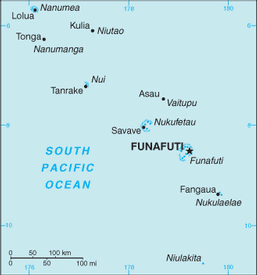Welcome to the Virtual Education Wiki ~ Open Education Wiki
Tuvalu
Experts situated in Tuvalu
None so far.
Tuvalu in a nutshell

Tuvalu, formerly known as the Ellice Islands, is a Polynesian island nation located in the Pacific Ocean midway between Hawaii and Australia. Its nearest neighbours are Kiribati, Samoa and Fiji.
"Tuvalu" means "group of eight" referring to the country's eight traditionally inhabited islands, but today it comprises four reef islands and five true atolls with a gross land area of just 26 square kilometres (10 sq mi): Nukulaelae, Nanumea, Nanumaga, Niutao, Nui Vaitupu, Nukufetau, Vaitupu, Niulakita, Funafuti. In terms of physical land size, Tuvalu is the fourth smallest country in the world, larger only than the Vatican City—0.44 km²; Monaco—1.95 km² and Nauru—21 km².
Its population is around 10,544 (July 2011 est.). It is the third-least populated independent country in the world, with only Vatican City and Nauru having fewer inhabitants.
It is also the second-smallest member by population of the United Nations.
History The first inhabitants of Tuvalu were Polynesian people. The islands came under Britain's sphere of influence in the late 19th century. The Ellice Islands were administered by Britain as part of a protectorate from 1892 to 1916 and as part of the Gilbert and Ellice Islands Colony from 1916 to 1974. In 1974 the Ellice Islanders voted for separate British dependency status as Tuvalu, separating from the Gilbert Islands which became Kiribati upon independence. Tuvalu became fully independent within the Commonwealth of Nations in 1978.
Education in Tuvalu
The Ministry of Education, Sports and Culture is responsible for education in Tuvalu.
The government's strategy for education aims to raise standards in teaching and learning; enhance the relevance of the curriculum; ensure adequate availability of education for special needs; and strengthen management of the education system.
There are eight years of compulsory education starting at age seven. The pupil-teacher ratio for primary is 25:1 and for secondary 25:1 (2001/02). The school year starts in January.
Note: There is a Tuvalu Teachers Association, at the Education Department of Nauti Primary School.
(sourced from http://www.commonwealth-of-nations.org/Tuvalu and Robert Whelan's Pacific eLearning Observatory brief)
Schools in Tuvalu
Pre-primary education / Early Childhood Care Education (ECCE) 19 pre-schools provide schooling for children of 3 - 5 year olds. All ECCE centres are community supported. Salaries for teachers are also paid for by the community with a small assistance grant from the government specifically allocated for salaries. Despite this, the government is the major supplier of resources to each centre.
Primary education
All children receive free primary education from the age of seven. Education is compulsory for seven years. The Tuvaluan school system has seven years of primary and six years of secondary education. The Primary Education sector comprises of Year 1 to Year 8. There are 10 primary schools, one on each island except Funafuti, the main capital island, which includes two primary schools. All children get promoted at the end of each Year until Year 8 where students have to sit the National Year Eight Examination, an entrance examination to Motufoua Secondary School. Students who are not successful in this examination are allowed to repeat Year 8.
In 1994, 1,906 students were enrolled in 11 primary schools.
Secondary education There are 2 secondary schools in Tuvalu: Motufoua Secondary School (or "Motufoua High") or Vaitupu and Fetuvalu High School on Funafuti.
Students board at the school during the school term, returning to their home islands each school vacation. In 1990, secondary schools had 345 students with 31 teachers.
(sourced from Wikipedia > Tuvalu > Education and http://www.nationsencyclopedia.com/Asia-and-Oceania/Tuvalu-EDUCATION.html)
According to Robert Whelan's Pacific eLearning Observatory brief about Tuvalu in 2007, the long-term objective of the Ministry of Education is to develop ICT as a curriculum course to be taught in classes at both primary and secondary level. Implementation depends on the ease with which funds can be raised from government and donor partners such as ADB, NZAid and AUSAid.
In consultation with stakeholders, experts and teachers the Ministry has begun developing an ICT curriculum with a 5-10 year timeline. The policy would encourage the development of access and skills by enhancing students’ capability to explore, develop, communicate and present their ideas; providing a range of information sources to support their development knowledge; providing tools, equipment and components for designing, such as modeling; and encouraging design awareness using technology.
The Education for Life program has been another important policy initiative, focusing also on lifelong learning. The identified challenges however are the small population which is widely dispersed, inadequate infrastructure, high costs and a lack of expertise.
Sourced from Robert Whelan's Pacific eLearning Observatory brief (2007)
Further and Higher education
Adult illiteracy is less than 5%.
Universities in Tuvalu
Tuvalu is a partner in the regional University of the South Pacific (USP), which has its main campus in Suva, Fiji Islands, and a campus on Funafuti, which was established in 1979.
Polytechnics in Tuvalu
The Maritime Training School on Funafuti (founded in 1979) offers vocational, technical and commerce courses.
Tuvalu Marine School was opened in 1979 with Australian aid.
Colleges in Tuvalu
There are no colleages in Tuvalu.
(sourced from Wikipedia > Tuvalu > Education and http://www.nationsencyclopedia.com/Asia-and-Oceania/Tuvalu-EDUCATION.html)